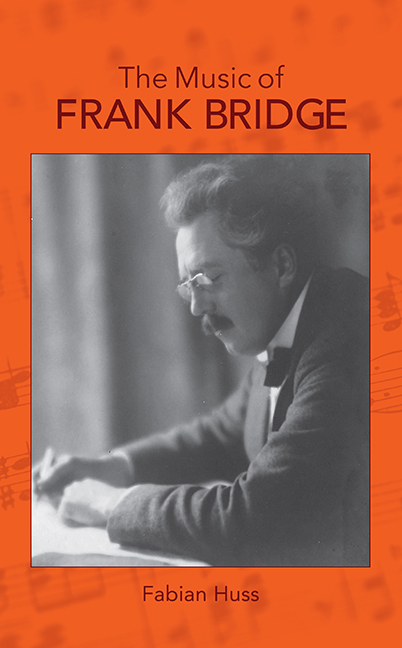Book contents
- Frontmatter
- Contents
- List of Musical Examples
- Acknowledgments
- Introduction
- Chapter 1 Background, Royal College of Music and Early Works
- Chapter 2 First Maturity
- Chapter 3 Transitional Period
- Chapter 4 Bridge’s Post-Tonal Idiom: Piano Sonata and Third String Quartet
- Interlude Elizabeth Sprague Coolidge
- Chapter 5 Progressive Works, 1927–1932
- Interlude Benjamin Britten
- Chapter 6 Last Years
- List of Works
- Bibliography
- Index
Chapter 5 - Progressive Works, 1927–1932
Published online by Cambridge University Press: 02 June 2021
- Frontmatter
- Contents
- List of Musical Examples
- Acknowledgments
- Introduction
- Chapter 1 Background, Royal College of Music and Early Works
- Chapter 2 First Maturity
- Chapter 3 Transitional Period
- Chapter 4 Bridge’s Post-Tonal Idiom: Piano Sonata and Third String Quartet
- Interlude Elizabeth Sprague Coolidge
- Chapter 5 Progressive Works, 1927–1932
- Interlude Benjamin Britten
- Chapter 6 Last Years
- List of Works
- Bibliography
- Index
Summary
WITH the patronage of Coolidge and the reduction of his performing and teaching workload, along with related changes in his lifestyle (including the establishment of a second, suburban residence in Friston), Bridge's life changed significantly in the first half of the 1920s. The Third String Quartet was the first major work to be attempted under the new circumstances, emphasising its pivotal position in his output. Coming to terms with the compositional problems of the quartet led to a prolonged period of productivity, as Bridge completed several of his greatest works in the next five years: three further chamber works – the Trio Rhapsody (1928), Second Piano Trio (1929) and Violin Sonata (1932) – and four major orchestral works – Enter Spring (1927), There is a willow grows aslant a brook (1927), Oration (1930) and Phantasm (1931). The style and language of these orchestral works are more varied than those of the chamber music, with the tonal material in Enter Spring in particular contrasting with the ambiguous mood and explorations of post-tonal logic of its companion piece There is a willow and the subsequent works. The orchestral works appear to have been conceived largely for British audiences, as Bridge was not in a position to promote them internationally without Coolidge's support; he tried to interest her in the orchestral works at different times, but without success, not least due to the onset of the Great Depression, which forced her to limit her activities as a promoter.
Bridge's later orchestral works struggled to find a place in the repertoire, and audiences and critics in England were often sceptical of his increasingly complex style. Interestingly, the exception to this trend was his most radical orchestral work, Oration, which appears to have been favourably received due to its resonance with wider aesthetic aspects of the period, but it nevertheless failed to secure a substantial number of performances. The modernist elements of Oration were contained within a framework that made sense to British commentators, but more abstract explorations of a comparable idiom were still often deemed unhealthy and immoral, as well as fundamentally un-English, a charge invoked in criticisms of Bridge's posttonal music, for instance in reviews of the Second Piano Trio. One claimed that:
in this present international vogue of atonalism [we are faced] with a new species of Kapellmeistermusik.
- Type
- Chapter
- Information
- The Music of Frank Bridge , pp. 159 - 192Publisher: Boydell & BrewerPrint publication year: 2015

